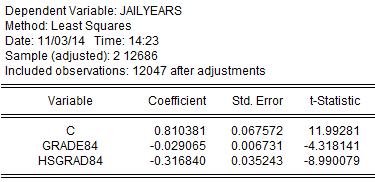Most of the payoff from education comes from credentials, not mere years of class time, a regularity known as the sheepskin effect. A quick look at crime as a function of education suggests a strong sheepskin effect for crime as well.
Are appearances revealing? I decided to see for myself in the NLSY. For convenience, I only look at the discrete effect of high school graduation, and equate “high school graduate” with “finished 12th grade.” My measure of crime continues to be the total number of times the respondent was interviewed in jail.
Baseline results confirm a massive sheepskin effect:
After adjusting for attitudes and teen behavior, continuous years of education actually seem to slightly increase incarceration:
If, like me, you view sheepskin effects as a strong symptom of signaling, this means that the selfish and social effects of education on crime sharply diverge. Getting your kid to finish high school genuinely reduces his expected jail time, albeit by markedly less than meets the eye. Socially speaking, however, trying to fight crime by getting everyone to finish high school is futile. The more degrees people have, the more degrees people need to get a good job. So regardless of the average education level, you should expect many young men at the bottom of the educational pecking order to continue to opt for crime over honest toil.
P.S. If worker quality exogenously increases, as I’ve explained before, we should expect education to go up and crime to go down. Rising education – even rising useless education – can be a symptom of social progress. But that doesn’t mean that rising education is progress.


READER COMMENTS
Gbenga
Nov 8 2014 at 9:46am
This is a bit off topic, but did you run any models with interactions between race and education? That coefficient on the Black variable really jumped out to me. Maybe education has real effects for Black (or Hispanic) youth that are not present for White youth.
Malcolm Kirkpatrick
Nov 8 2014 at 2:12pm
(Caplan): “After adjusting for attitudes and teen behavior, continuous years of education actually seem to slightly increase incarceration: …
Of course, the criminogenic effect of years of education is neither statistically significant nor plausible.”
Of course “years of education” increases incarceration. We reap what we sow. NOT(education = attendance at school). For many normal, active children six hours of forced inactivity is abuse. Compulsory unpaid labor is slavery. Schools give to many children no reason to do what schools require. In Hawaii, juvenile arrests fall in summer, when school is NOT in session.
Malcolm Kirkpatrick
Nov 8 2014 at 5:55pm
“Schooling and Violence”
E. G. West
Carleton University, Department of Economics,
Ottawa, Canada
Kevin
Nov 10 2014 at 2:05pm
Wouldn’t the appropriate regression to apply here be Poisson instead of OLS?
Comments are closed.